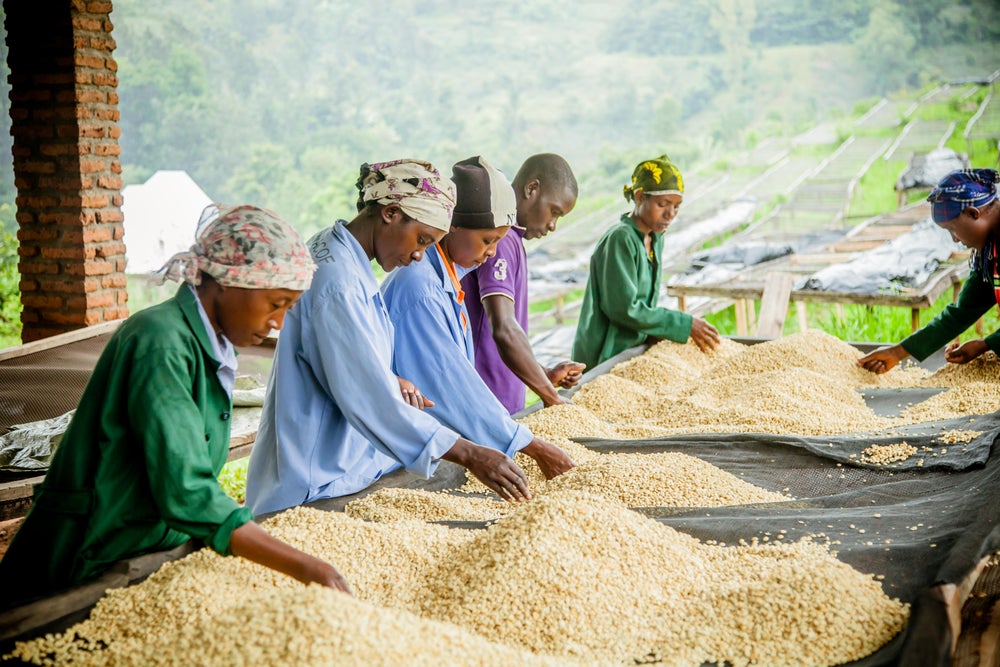
رواندا - موشوني
وعلى الرغم من تاريخها المضطرب، أصبحت رواندا اليوم واحدة من الدول المفضلة في عالم القهوة المتخصصة - لسبب وجيه!
المزرعة: محطة غسيل موشوني
الصنف: أحمر بوربون
المعالجة: غسل تجريبي
الارتفاع: 1800 إلى 1950 متر فوق مستوى سطح البحر
المنطقة: منطقة روتسيرو، المنطقة الغربية
ملاحظات التذوق: تفاحة مسكرة ناضجة، فاكهة سانكيست الناضجة، حلوى الكراميل الحلوة

تقع محطة غسيل موشونيي على بعد كيلومتر واحد فقط من شواطئ بحيرة كيفو. يعيش 1200 مزارع يسلمون الكرز إلى هذه المحطة ويزرعون على التلال المحيطة بموشونيي.
تم بناء محطة موشوني في الأصل من قبل الجيش. في ذلك الوقت، توقع الجيش كميات كبيرة من الكرز، فقام بالبناء وفقًا للحجم. تحتوي المحطة على ثمانية خزانات تخمير، وقناة غسيل قياسية، وسقيفة فرز الكرز لإجراء فرز إضافي قبل طحن الكرز. تحافظ شركة سوكافينا في رواندا على هذه البنية الأساسية في حالة ممتازة، حتى في السنوات التي تتجاوز فيها سعة محطة الغسيل حجم الكرز المسلم.
زراعة
في التلال المحيطة بموشوني، يمكن أن يتراوح الارتفاع من 1600 متر إلى 1950 متر فوق مستوى سطح البحر. يزرع المزارعون في المتوسط حوالي 300 شجرة بن فقط في قطع أراضيهم الصغيرة. كما يزرع العديد منهم الموز والأوكالبتوس والكسافا لتوليد دخل إضافي.

الحصاد وما بعد الحصاد
بعد شراء الكرز من المنتجين، يرسل موشوني الكرز إلى عملية فرز صارمة. أولاً، يقوم موظفو محطة الغسيل بإزالة أي كرز أقل جودة من خلال التعويم. ثم يقوم موظفون مدربون خصيصًا بفحص الكرز المتبقي بصريًا بحثًا عن أي عيوب بصرية.
بعد تناول الكرز، يتم وضعه في أكياس GranPro وإغلاقها حتى يتخمر بشكل لاهوائي لمدة 24 ساعة. وللحفاظ على الاتساق، يتم ملء كل كيس بـ 60 كجم من الكرز، ويتم الاحتفاظ بجميع الأكياس في بيئة خاضعة للرقابة لضمان التخمير المنتظم.
بعد التخمير، يتم تقطيع الكرز باستخدام آلة تقطيع اللب القرصية. يتم تقطيع كل كيس على حدة ويتم الاحتفاظ بسجلات لتتبع كل دفعة من القهوة على حدة. يتم وضع القهوة في خزانات التخمير وتخميرها لمدة 24 ساعة إضافية قبل غسلها في ماء نظيف لإزالة أي مادة لزجة متبقية. يتم وضع الرق على سطح مرتفع.
يقوم العمال بفرز ورق البرشمان المجفف يدويًا بصريًا لإزالة أي حبوب تالفة أو معيبة. كما يقومون بتمشيط ورق البرشمان بشكل متكرر لضمان التجفيف المتساوي. يستغرق تجفيف ورق البرشمان حوالي 21 يومًا.
تخلق طريقة المعالجة الفريدة هذه تركيبة متوازنة ومعقدة في نفس الوقت، مما يتحدى خبراء التحميص في المنافسة. عندما يتم تحميصها بمهارة، تكون هذه القهوة لذيذة حقًا وذات نكهة مميزة.

القهوة في رواندا
وعلى الرغم من تاريخها المضطرب، أصبحت رواندا اليوم واحدة من الدول المفضلة في عالم القهوة المتخصصة - لسبب وجيه!
جلب المبشرون والمستوطنون الألمان القهوة إلى رواندا في أوائل القرن العشرين. وتم تأسيس إنتاج القهوة على نطاق واسع خلال ثلاثينيات وأربعينيات القرن العشرين من قبل الحكومة الاستعمارية البلجيكية. واستمر إنتاج القهوة بعد رحيل المستعمرين البلجيكيين. وبحلول عام 1970، أصبحت القهوة أكبر صادرات رواندا ومثلت 70٪ من إجمالي عائدات التصدير. كانت القهوة تعتبر ذات قيمة كبيرة لدرجة أنه اعتبارًا من عام 1973، أصبح من غير القانوني اقتلاع أشجار القهوة من الأرض.
بين عامي 1989 و1993، تسبب انهيار اتفاقية البن الدولية في انخفاض الأسعار العالمية. وتضررت الحكومة والاقتصاد الرواندي بشدة من انخفاض أسعار البن العالمية. أدت الإبادة الجماعية عام 1994 وما تلاها إلى انهيار كامل لصادرات البن وإيرادات الدولار الأمريكي الحيوية، لكن المرونة المذهلة للشعب الرواندي واضحة في الطريقة التي تعافى بها الاقتصاد والاستقرار منذ ذلك الحين. تعتبر رواندا الحديثة واحدة من أكثر البلدان استقرارًا في المنطقة. منذ عام 2003، نما اقتصادها بنسبة 7-8٪ سنويًا ولعب إنتاج البن دورًا رئيسيًا في هذا النمو الاقتصادي. كما لعب البن دورًا في التقدم الكبير الذي أحرزته رواندا نحو المساواة بين الجنسين. لقد أدت المبادرات الجديدة التي تلبي احتياجات النساء وتركز على مساعدتهن في تجهيز أنفسهن بالأدوات والمعرفة اللازمة للزراعة إلى تغيير الطريقة التي تنظر بها النساء إلى أنفسهن وتتفاعل مع العالم من حولهن.
اليوم، يدفع صغار المزارعين الصناعة في رواندا إلى الأمام. لا توجد في البلاد أي مزارع كبيرة. يزرع معظم البن أكثر من 400 ألف مزارع صغير، يمتلكون أقل من ربع هكتار. غالبية إنتاج البن في رواندا من أرابيكا. تشكل نباتات صنف بوربون 95% من جميع أشجار البن المزروعة في رواندا.











